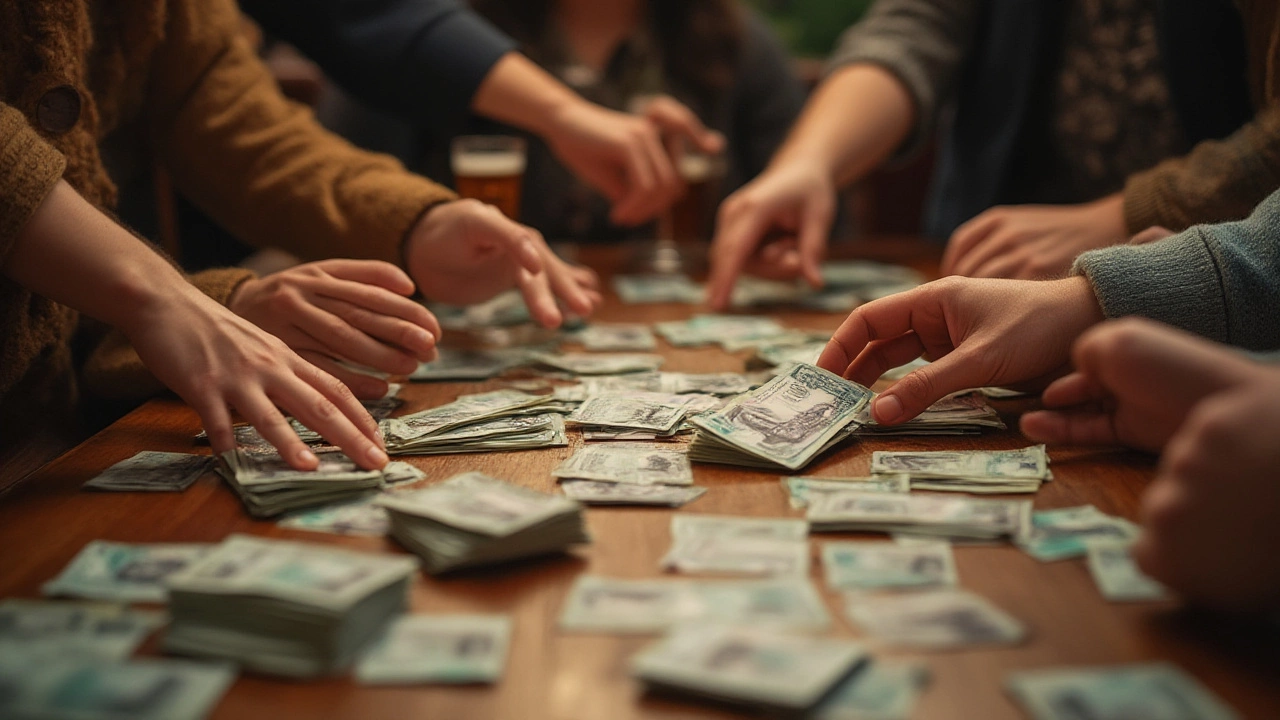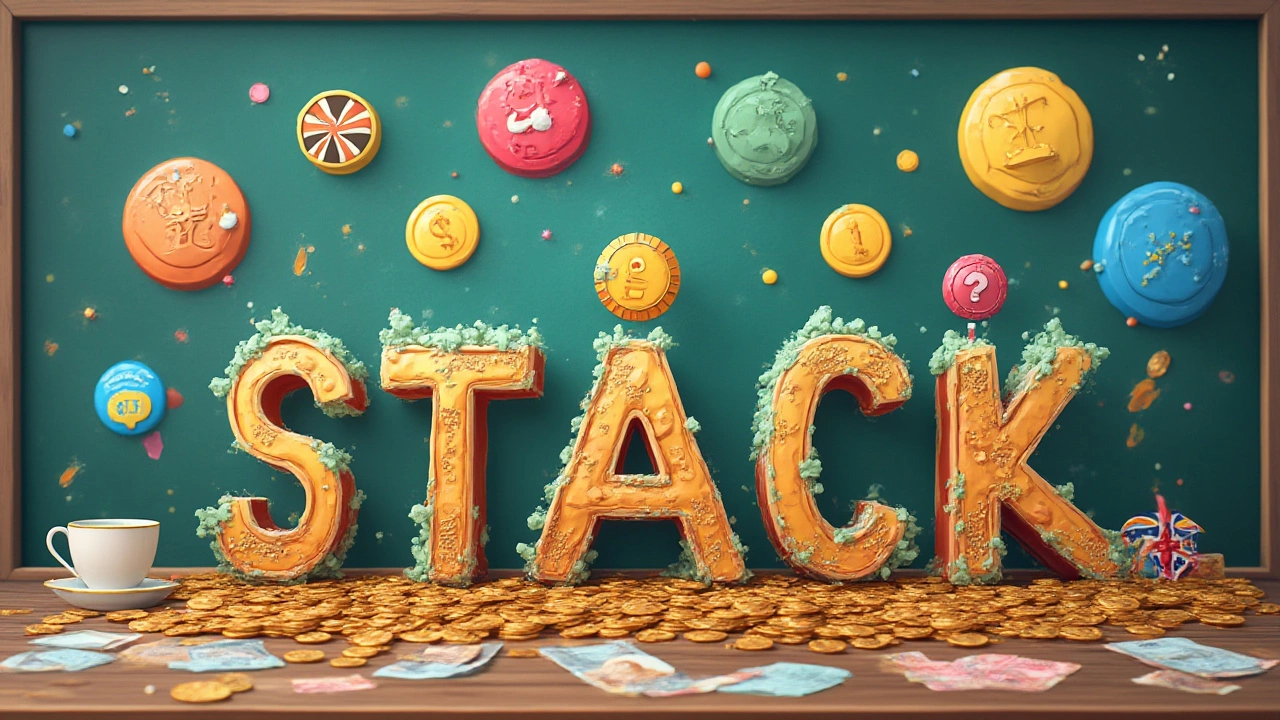What Does 'A Stack' Mean in Slang? Understanding Money Lingo
 Jul, 29 2025
Jul, 29 2025
You’ve probably heard it in a song or overheard it in conversation and thought, “Wait, how much is a stack?” Whether it pops up in a hip-hop track I catch on the radio during my morning drive (with Dorian drumming away in the backseat and Selena rolling her eyes at my music taste), or someone’s bragging about dropping stacks at the mall, this slang has slipped into everyday life. But what does it really mean, and where did it come from? It can mean the difference between walking out of a store with a handful of groceries or walking out with a new flat-screen TV—seriously. There’s something about money slang that gets people talking, and stacks might be one of the most mysterious, but also one of the most widely used.
The Meaning of "A Stack" in Slang
So, let’s cut right to it: when someone mentions “a stack” and they’re talking about money, how much are they dealing with? In most parts of the U.S., a stack means $1,000. The imagery is straight to the point—a stack of one-hundred $10 bills, or preferably, one-hundred-dollar bills neatly bundled with a paper band like something out of a music video. That visual is powerful. The term gets tossed around in all kinds of conversations. When I hear my son’s friends saying, “He dropped a stack on those sneakers,” you can bet they’re talking about a thousand bucks shelled out just for footwear. Some people confuse it with “rack,” but a stack is — almost always — a grand, no more, no less.
The origin? Word on the street is that this slang blew up in urban communities during the late 20th century. Picture hip-hop concerts, bustling city corners, and deals being made with thick wads of cash wrapped in bright bands. Those money bricks earned the nickname “stacks.” Rap and hip-hop tracks helped bring the lingo mainstream, with artists like 50 Cent and Lil Wayne name-dropping "stacks" to mean serious cash. Yet, the term's not just for the rich and famous. It's found its way into boardrooms, high school hallways, and every spot in-between. Ask anyone who spends time around cash—bartenders, casino workers, retail managers—they’ll know exactly what a stack is.
How People Use "Stack" in Everyday Life
You don’t have to be hustling at a Las Vegas casino or living in a music video to know what a stack is. The word pops up everywhere: “I put down a stack on my car last week,” or “She saved a stack for her summer trip.” It’s not just street language; it’s slipped seamlessly into suburban kitchens, sports chats, and even the school campus. Often, you’ll hear it used to sound casual or make something impressive sound even more impressive. My daughter Selena once told me a story about a classmate flashing stacks at a party. It’s flashy, a touch show-offy, but undeniably part of the teenage lexicon.
The interesting thing is how institutional it’s become. Even athletes and celebrities use “stack” when talking about their purchases or donations. But more than that, it’s a word that crosses ethnic groups and generations. People might use “grand,” “G,” or “rack,” but “stack” carries a visual punch. When you picture a stack, you don’t imagine coins or cards—you see paper money bound neatly. If you ever wondered if the term could be confused or misused, that practically never happens: anyone familiar with U.S. cash can give you a quick, no-nonsense definition.
Oh, and here’s a tip: next time you’re out negotiating a major purchase—maybe even haggling over a used car or bidding at a local auction—casually mention dropping a stack. Watch how quickly people take you seriously. It has an immediate effect, even if you’re just talking big for leverage.

Stacks, Racks, and Other Money Slang Explained
Money isn’t just about numbers—it’s loaded with slang. Besides “stack,” you’ll hear other terms like “rack” and “G.” A “rack” is also $1,000 in most places, used nearly the same as “stack.” Some folks argue there’s a difference, but everyday use blurs the line. A “G” is simpler—it refers to a grand, or a thousand dollars. Some older slang—like “C-note” for a hundred—is still hanging on, but “stack” stands out because it’s so clear and vivid in the mind.
The evolution of money slang is pretty fascinating. Early 20th-century terms like “sawbuck” for $10 and “Benjamin” for a $100 bill by the 1990s started fading once music and pop culture latched onto newer, edgier words. “Stack” thrived in this environment. Today, you’ll catch kids as young as 11 and 12 using it, especially if they’re into YouTube, TikTok, or rap lyrics. My own kids joke about “stacking paper” when they get birthday cards filled with cash from relatives.
Want to know why these terms stick? They make a simple thing (money) memorable and cool. It’s far more interesting to say you’ve got “stacks,” than just, “I have some money.” It’s about painting a picture, creating a vibe.
Famous Quotes and Cultural References Featuring "Stack"
The impact of pop culture on the word “stack” can’t be overstated. Turn on any popular hip-hop playlist, and you’ll hear stacks mentioned as shorthand for wealth, status, and hustle. It’s more than just a dollar amount—it’s a symbol. In one interview, rapper Future famously said,
“Money, stacks, and bands—if you don’t know how to get them, you better learn.”That sums up the cultural weight “stack” carries. It’s aspirational, just as much about chasing success as it is about actual cash.
Movies and TV shows have also picked up the term. Crime dramas love to drop a “stack” reference during deals or exchanges. Sports commentary uses it too: “That signing bonus? He’s getting a stack a week.” Why? Because the word has bite; it’s got energy. Nike, Adidas, and other big brands have even run marketing campaigns playing off the word, tapping into that cultural association with success and ambition. It’s not just slang—it’s a branding moment.
Even in memes or internet jokes, a “stack” features as the go-to image for big money (or at least big dreams). If you scroll through Reddit’s finance threads or even my nephew’s group chat, you’ll catch “how many stacks would you need to buy a Lambo?” and the like. It says a lot about the word’s staying power, crossing from music into every corner of pop culture.

Fun Facts, Tips, and Data About Money Stacks
You might be surprised at some of the hard numbers and trivia around stacks. For example, a stack of $1,000 in $100 bills is a paper-thin bundle—fits right in your front pocket. But a stack of $1 bills? That’s a thick brick. Bank tellers, like my friend Jenny, know the difference—she handles stacks every day, but she’ll tell you that real “high rollers” never want stacks made of singles.
Want to sound like you know what you’re talking about? Here’s a quick breakdown to impress your friends:
| Term | Value (USD) | Origin Hint |
|---|---|---|
| Stack | 1,000 | Urban, hip-hop, now widespread |
| Rack | 1,000 | Similar to 'Stack', often interchangeable |
| Band | 1,000 | From the colored band on bundles of cash |
| G / Grand | 1,000 | Older usage, still common |
| Benjamin | 100 | $100 bill features Ben Franklin |
One tip for anyone handling real cash: always count your stack before you leave the counter, just in case. And if you’re ever at a bank, know that stacks get wrapped with color-coded bands ($1,000 in $100 bills is marked yellow according to Federal Reserve guidelines).
A weird fact: a million dollars in stacks of $100 bills fits inside a regular grocery bag, but try fitting a million in single dollar bills and you’d fill more than a few shopping carts. TV shows exaggerate the size for drama, but the real thing is a lot more discreet.
Getting into slang like “stack” is about more than just sounding cool; it’s about understanding a little piece of financial culture. Next time you hear someone say they’re stacking or flashing a stack, you’ll know exactly what’s going on. By the way, always keep your stacks safe from prying eyes and from hungry dogs—Charlie once chewed through a ten-dollar bill thinking it was a treat. Lesson learned: hide your cash, even from the family pet.